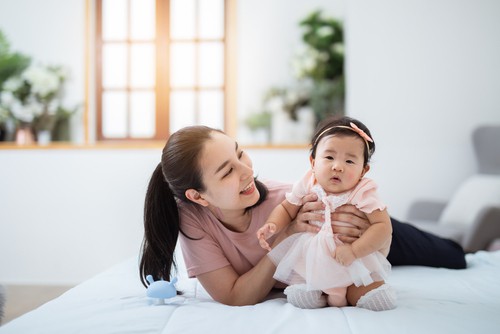
When Should I Start Looking For A Confinement Nanny?
August 30, 2021
How to Know If Your Newborn is Full?
November 9, 2021Should I Bath After Giving Birth?

Should I Bath After Giving Birth? Giving birth is one of the most beautiful things in life, but giving birth also means starting a new chapter in your life. But what about after you’ve given birth? It can be boring lying around at home all day with nothing much to do. So how are mothers coping post-birth confinement period?
Table of Contents
You Can’t Take A Bath After Giving Birth In Singapore

Yes, Singapore has a no bathing rule for the mother who just gave birth. The rule falls under the confinement period, which usually starts from 2 weeks to 30 days after giving birth.
A mother would usually ask, “What if I want to take a bath?” Actually, taking a shower is fine as long as it is done carefully. One should NOT pour hot water directly onto oneself because this could induce vomiting and nausea, which is very common among postnatal mothers.
After all, the body has gone through changes during pregnancy. Those who are not careful enough would also end up injuring themselves. This usually happens due to poor balance since one has to switch positions when using different spouts in the bathroom.
Some even forget that they have stitches on them until they accidentally injured themselves or caused discomfort by standing for too long or bumping into something hard because their sense of feeling was dulled down for a while after giving birth.
Every pregnant woman has heard it at least once: You can’t use that tub for a month after giving birth. There are many reasons why this is the case, ranging from bleeding to infection. The bottom line? It’s best to stay out of the bathtub until your doctor gives you the green light.
Decreased hormone levels

After having a baby, women experience depressed lactation, which results in decreased estrogen and progesterone levels. Reduced hormone levels cause an increased rate of microscopic bleeding between periods, known as lochia.
Due to prolactin released during breastfeeding, some mothers experience amenorrhea (absence of menstruation). All these factors combined increase the chance of contracting infections such as urinary tract or yeast infections.
Risk of infection, especially when having a cesarean section (C-section)

Not only can you contract an infection if you give birth vaginally, but you also risk the chance of developing an infection after having your baby via a C-section. Most people think that once they’ve given birth to their child, any bacteria introduced have already been dealt with. But this isn’t true.
Your doctor must first cut through several layers of skin and tissue before reaching your uterus, each one providing another breeding ground for various harmful bacteria. In some cases, doctors even recommend leaving drains in place after surgery as a precautionary measure against accumulating fluids from resulting infections.
Baths are not recommended due to stagnant blood levels after birth

If you experience excessive bleeding during delivery or any other symptom characterized by loss of large amounts of blood postpartum (such as hemorrhage), your doctor will probably recommend limiting baths until all traces of blood have cleared out of your system. When you take a bath, stagnant blood levels rise back to the surface, increasing the risk of bleeding.
Risk of infection due to the lowered immune system

When your body is recovering from all it has been through, you don’t want any additional stress in the form of infections. Your weakened state places you at an even greater risk for developing postpartum infections. Also, to assist with milk production, prolactin levels are increased, which decreases immune function.
Baths can cause water retention when it would be better to drain excess fluids naturally

If you have experienced blood loss during delivery, your doctor might prescribe a drainage plan that includes wearing special pads or compression devices. The theory behind using these items is that they help your uterus return to its normal size. During this process, you will need to drain off excess fluids; anything that helps the body do this more efficiently is welcome!
Your doctor might even prescribe a medication such as methergine (methylergonovine) which helps shrink your uterus and also increase uterine contractions. The result of excess fluid retention can include pain, discomfort, and an increased risk of developing blood clots or lymphatic blockage.
Internal stitches may need time to heal

Sometimes women will require stitches during delivery for various reasons, such as lacerations occurring on the perineum area after childbirth or tears caused by forceps. If these stitches are internal, they will likely dissolve on their own, but there is some time that must pass before the dissolve is complete.
No time (during maternity leave)

Some new mothers don’t have time to relax long enough to enjoy a good soak in the tub! All they want to do is spend every waking moment with their newborns, and sometimes that means rushing around just trying to survive.
No privacy

For some women, it is difficult enough knowing that their bodies have changed; other women might feel ashamed or embarrassed about the changes post-birth. The last thing they need is for other people to see what they’re going through! Most of these women would prefer to take quick showers without soap (water only) rather than subject themselves to scrutiny from others.
Reasons Why You Can’t Bath After Giving Birth – Conclusion
It is important to stay clean after giving birth. Helpful tips are given that explain why you can’t bathe after childbirth, but how you should be cleaning up the vaginal area and changing your pads regularly. It is also recommended for mothers not to wear underwear or tampons while they’re bleeding as it increases the risk of infection.



